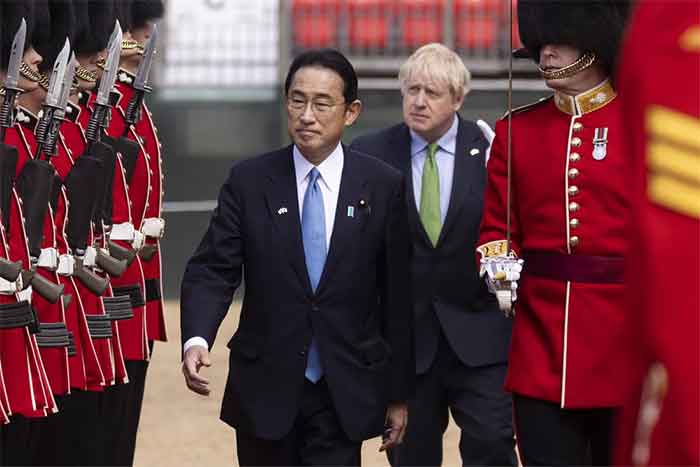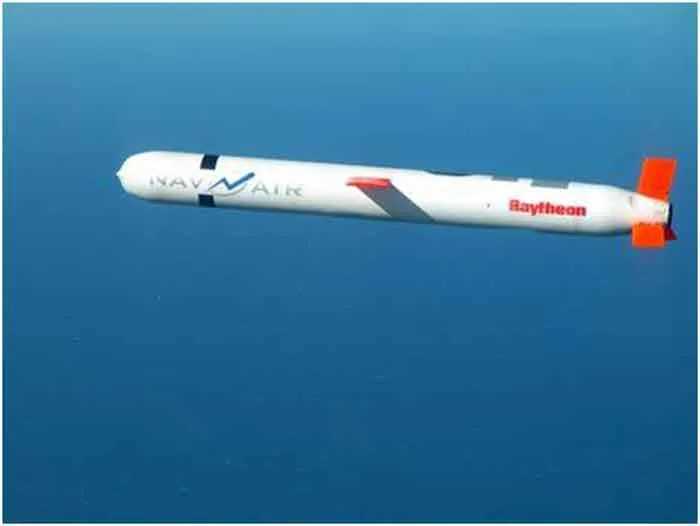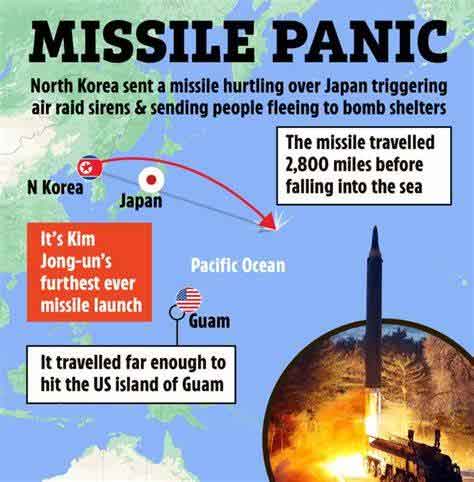
The UK and Japan have agreed a defense deal that will allow their national forces to “work more closely together”, British Prime Minister Boris Johnson said on Thursday.
The British PM, speaking in Downing Street alongside his Japanese counterpart, Fumio Kishida, said he is “so glad” the two nations have agreed a reciprocal access agreement for the armed services.
He said allies in Europe and East Asia have to be unified in the face of “autocratic, coercive powers”.
The Japanese PM’s first official visit to Britain was marked with a guard of honor and an RAF fly-past over Horse Guards Parade in central London.
Before holding talks in No 10 on Thursday, the two leaders stood on a dais as they observed a Voyager and two Typhoon fighter jets soar over St James’ Park and the parade ground.
Johnson and Kishida had a meeting at Downing Street where the British PM announced that a military accord had been struck.
The British PM said the world has observed the “strong stance” the Japanese government has taken “against the Russian aggression in Ukraine”.
Security In Europe Is Indivisible From Security In The Asia-Pacific, Says British PM
“We in the UK recognize that our security in Europe is indivisible from the security, our collective security, in the Asia-Pacific, in the Indo-Pacific region,” he added.
“And there is direct read across from the actions of autocratic, coercive powers in Europe, to what may happen in East Asia.
“And that is why we want to work more closely together.
“And today I am so glad that we have agreed the reciprocal access agreement between our armed services.”
In an account of the meeting issued afterwards by Downing Street, a spokeswoman said the two Group of Seven leaders agreed “democracies around the world needed to stand in unity against authoritarian regimes”.
No 10 said the “landmark” agreement will allow the two countries’ forces to deploy together for training, joint exercises and disaster relief.
Officials said the agreement will boost the UK’s commitment to the Indo-Pacific and further safeguard global peace and security, building on the already close collaboration on defense and security technology between both nations.
Talks began on deepening the UK-Japan defense relationship in September, following the government’s defense and foreign policy integrated review which last year announced a “tilt” towards the Indo-Pacific.
The UK government describes Japan as its closest security partner in Asia.
Tokyo’s Two Other Bilateral Visiting Forces Agreements
Officials said Tokyo has only two other bilateral visiting forces agreements — one with the U.S. and the recently agreed agreement signed with Australia in January.
No 10 confirmed the prime minister discussed working closely with Japan as the UK “progresses its accession to the CPTPP [Comprehensive and Progressive Agreement for Trans-Pacific Partnership] trade bloc” after Brexit.
The Japanese PM told the UK PM he had been looking forward to a “very fruitful discussion” on the London-Tokyo bilateral relationship, as well as on Ukraine and global affairs.
The pair agreed in principle to work more closely militarily in the Indo-Pacific, while the UK said it would soon lift the remaining restrictions on some food products in place since the 2011 disaster at the Fukushima nuclear plant.
The agreement will allow Japanese and British forces to deploy together to carry out training and joint exercises in the Indo-Pacific, in what the UK government says is the first deal of its type with a European country.
The Five Eyes Intelligence Alliance
The two countries already enjoy deep security ties, and Tokyo’s ambassador to Australia, Yamagami Shingo, told the Sydney Morning Herald that he hoped plans for Japan to join the Five Eyes intelligence alliance between Australia, Canada, New Zealand, the UK, and the U.S., would “become reality in the near future”.
The UK, Australia and the U.S. last September announced a new military alliance — AUKUS — to counter a rising China in the Indo-Pacific region.
London, shorn of its European obligations now that it is no longer a member of the EU, is increasingly looking to the region for post-Brexit trade opportunities.
The UK last February applied for membership of the 11-nation Asia-Pacific free trade bloc, and in October 2020 signed a free trade deal with Japan.
Radiation Risk To UK consumers
The Food Standards Agency in December last year said scientists said removing the Fukushima restrictions on foods such as some fish, wild mushrooms and foraged vegetables would have a “negligible increase” in radiation risk to UK consumers.
Thursday’s talks also focused on the war in Ukraine that marked the end of the post-Cold War period and had major implications for wider international stability.
In December 2021, Japan’s cabinet approved Friday a record defense budget of 5.4 trillion yen ($47.2 billion) for the year starting in April, as it seeks to bolster its ability to fend off threats from neighboring China.
The figure marks the 10th straight increase in annual defense spending and exceeds a ceiling of 1% of gross domestic product that the pacifist country has largely maintained for decades. The plan follows record defense spending in a supplementary budget passed by parliament this week.
Japan’s military budget is modest by comparison with its ally the U.S., at an estimated $778 billion for 2020, and China at $252 billion, according to the Stockholm International Peace Research Institute.
Ties between Japan and China turned increasingly chilly after Beijing’s clampdown on Hong Kong in 2020 and ships from both countries continue to chase one another around islands they both claim in the East China Sea. Japanese officials, including PM Kishida, have also become increasingly outspoken about the need to prepare for a contingency around Taiwan.
German Chancellor Olaf Scholz during his Asia visit in late April bypassed China, Germany’s biggest Asian trading partner, in favor of Japan. Germany and Japan, the two former Axis powers, are aiming at closer military cooperation, spurred by concerns over China and Russia.
Germany sent a frigate to Japan last year for joint naval exercises. Both countries have pledged to boost their defense spending.















































